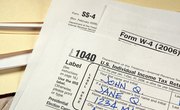
If you have to move unexpectedly, you might not have the cash resources available that you would have if you had been able to plan several months in advance. If you come up short, you might be tempted to raid your IRA for extra funds. However, before taking out that IRA money, you need to be aware of the potential penalties.
No Exceptions for Moving Expenses
The IRS does not make an exception to the early-withdrawal penalty for moving expenses. Even if your move qualifies you for the moving-expenses income tax deduction, it does not exempt you from the early-withdrawal penalty.
However, if you have another qualifying reason for the early distribution, you can avoid the penalty. For example, if you move and purchase your first home, you can qualify for a penalty-free withdrawal of up to $10,000 to help with the costs of the home.
Able to Remove Money Anyway
Even though the IRS does not waive the early-withdrawal penalty for your IRA distribution, you may still take the money out; you will have to pay a penalty. You may remove money from your IRA for any reason, whenever you want. The IRS simply charges you a 10 percent early-withdrawal penalty on the taxable portion of the distribution. This penalty is on top of whatever income taxes you owe on the distribution, not instead of those taxes.
Roth Contribution Withdrawals
The early-withdrawal penalty applies only to the taxable portion of your IRA distribution. When you take money out of a Roth IRA, you remove all of your contributions first. Because you did not receive a tax deduction for those Roth IRA contributions, you can take them out tax-free, and therefore penalty-free. Once you take out all the contributions, you start taking out earnings, which are subject to income taxes and the early-withdrawal penalty.
Tax Reporting of Early Withdrawals
If you elect to take money out of your IRA for moving expenses, you have to report it on your income taxes. Roth IRA withdrawals require filing of Form 8606 to figure out whether you are withdrawing contributions, earnings, or both. If you took a traditional IRA withdrawal, or if your Roth IRA contains earnings, file Form 5329 to compute your early-withdrawal penalty.
Finally, file your taxes with Form 1040 and report the IRA distribution as taxable income. The exception is for Roth IRA contribution withdrawals, which you report as nontaxable IRA distributions.
References
- Internal Revenue Service: Publication 590
- Internal Revenue Service: Instructions for Form 5329
- Internal Revenue Service: Instructions for Form 8606
- Internal Revenue Service. "Retirement Topics - Exceptions to Tax on Early Distributions." Accessed Mar. 20, 2020.
- Internal Revenue Service. "Topic No. 557 Additional Tax on Early Distributions from Traditional and Roth IRAs." Accessed June 19, 2020.
- Internal Revenue Service. "Traditional and Roth IRAs." Accessed June 19, 2020.
- Internal Revenue Service. "Traditional IRAs." Accessed Mar. 20, 2020.
- Internal Revenue Service. "Topic No. 451 Individual Retirement Arrangements (IRAs)." Accessed June 19, 2020.
- Internal Revenue Service. "Roth IRAs." Accessed Mar. 20, 2020.
- Internal Revenue Service. "Publication 590-B (2019), Distributions from Individual Retirement Arrangements (IRAs)." Accessed Mar. 20, 2020.
- Internal Revenue Service. "Designated Roth Accounts - Distributions." Accessed Mar. 20, 2020.
- Internal Revenue Service. "Retirement Topics - Exceptions to Tax on Early Distributions." Accessed June 19, 2020.
Writer Bio
Based in the Kansas City area, Mike specializes in personal finance and business topics. He has been writing since 2009 and has been published by "Quicken," "TurboTax," and "The Motley Fool."

